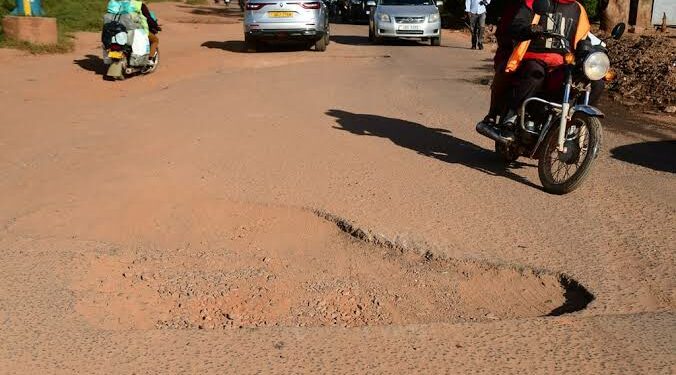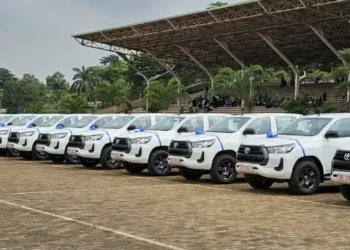In the heart of East Africa lies Kampala City, a bustling city that once stood as a symbol of progress and promise. However, beneath the surface of its vibrant culture and dynamic energy, a grim reality has been quietly unraveling – the deplorable state of its roads. Much like the poignant tale of Chinua Achebe’s “Things Fall Apart,” the road infrastructure of Kampala City is crumbling, and the repercussions are far-reaching.
In the opening chapters of Achebe’s masterpiece, the protagonist, Okonkwo, witnesses the decay of his traditional Igbo society, and the subsequent erosion of its cultural fabric. Similarly, the roads of Kampala City, once robust arteries connecting communities and fostering economic growth, now mirror the decline of a once-thriving urban landscape.
The decay of Kampala’s roads is not merely a cosmetic concern; it is a symptom of deeper systemic issues with Kampala Capital City Authority (KCCA) that have festered over time. As the city’s population swells and the demand for efficient transportation infrastructure rises, the roads have been left neglected and overwhelmed.
Potholes, like scars on the face of a forgotten city, dot the landscape, causing daily inconveniences and contributing to a growing sense of disillusionment among its residents and accidents.
Achebe’s narrative explores the clash between tradition and modernity, and in a parallel vein, Kampala City finds itself at a crossroads where outdated road infrastructure clashes with the demands of a modern urban society. The once-reliable roads have become a hindrance to progress, stifling economic activities and impeding the flow of goods and services. The city’s potential for growth is now hindered by the very infrastructure meant to facilitate it.
Much like the impact of colonialism on the Igbo society in “Things Fall Apart,” external factors have also played a role in the decline of Kampala’s roads. Insufficient funding, mismanagement, and a lack of strategic planning have all contributed to the deterioration of a vital aspect of the city’s infrastructure. The once-solid foundation has crumbled, leaving the people of Kampala grappling with the consequences.
In a curious juxtaposition, opposition politicians have taken a unique approach to demonstrate their concern for the crumbling state of the city’s roads. In an act of symbolic protest, they have embarked on an unconventional campaign, planting trees and banana suckers in the potholes that mar the streets of Kampala. This peculiar form of activism highlights both the severity of the road crisis and the need for innovative solutions to address it.
The city’s predicament is further underscored by the ongoing NAM (Non-Aligned Movement) summit, where the state has directed efforts to beautify only the areas where visitors are set to sleep and converge. This selective approach to infrastructure improvement reflects a disconcerting prioritization of appearances over substance, leaving the majority of the city in a state of disrepair.
As the roads of Kampala continue to crumble, the city risks descending into a state of disarray that may prove challenging to reverse. It is a narrative of neglect and decay, mirroring the tragic trajectory of “Things Fall Apart.” The question remains: Can Kampala rise from the ashes, repair its fractured infrastructure, and rewrite its story?
The answer lies not only in the hands of policymakers but in the collective will of the people to demand change and reconstruction. In the evocative words of Chinua Achebe, “Things fall apart, the center cannot hold.” As the roads of Kampala crumble, so too does the very core of the city’s vitality.
The symbolic planting of trees and banana suckers in potholes by opposition politicians serves as a poignant reminder that innovative solutions are needed to navigate the labyrinth of neglect and decay. The ongoing NAM summit, with its selective beautification, echoes the disconcerting truth that appearances often take precedence over the substance of essential infrastructure.
Kampala City stands at a crossroads, much like the Igbo society in Achebe’s classic. The collective will of the people must rise above the potholes and scars, demanding change, reconstruction, and a commitment to a future where progress is not just a façade but a reality.
As the echoes of “Things Fall Apart” reverberate through the crumbling streets, Kampala has the opportunity to script a different narrative—one of resilience, renewal, and the triumph of a city determined to rise from its own ashes. The question lingers in the air, awaiting an answer that transcends the pages of a novel and becomes a living testament to the strength of a community determined to rebuild what has fallen apart.
Do you have a story in your community or an opinion to share with us: Email us at editorial@watchdoguganda.com














